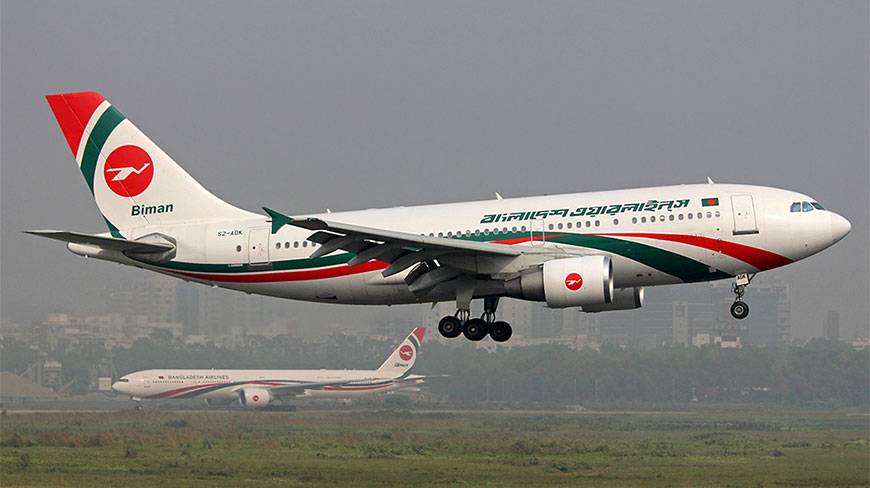This beleaguered airline, which began with a bang, is the perfect example of how, with all the razzmatazz, something can fail to lift off

- How long till it’s grounded for good?
The official line given at the sudden departure of the British MD of Biman appointed a year ago, Kevin Steele, was that he was forced to quit the airline faced with health issues. Somehow, this line does not appear to be the full truth.
Obviously anyone can develop illnesses which can hamper work and lead someone to opt for a way out, but once the roller-coaster events of Biman over the past year are analysed, it becomes quite evident that in the face of a hydra-headed monster, perhaps the steely resolve of Kevin Steele finally capitulated.
We are reminded of the powerful Bengali aphorism: “Dosh chokre bhogoban bhut hote badhyo,” which in English means that when the forces of evil are united and overpowering, sometimes the good either falters or joins them.
That Biman has, for the longest time, been an ailing aircraft is not a new finding; the national carrier had been struggling since the early 90s with successive governments failing to reign in on a variety of allegations, ranging from shady ticket sales, to misuse of funds, to appointment of unskilled staff.
The rotting had actually begun much earlier in the early 80s when the carrier started developing the habit of missing arrival and departure times.
As I distinctly remember, sitting inside the Tejgaon Airport sometime around the 80s, the flight announcer, exasperated by repeated queries from irate passengers, finally declared: “Beiman (ingrate) is finally arriving from Chittagong after a six hour delay.”
But surprisingly, the history of the airline shows a period of strong initial success gradually getting lost in a whirlpool of complexities.
In the mid-70s, when Biman, as a new airliner of a fledgling country, began its journey with their “Majestic all the way” tagline, there were very few competitors around.
Special packages were launched, the airline was tagged with the tourism Bangladesh campaign (can still be seen in Parjatan motels) plus adverts, both on TV and other mediums, which lured in passengers.
A famous 70s TV advert showed a young couple taking Biman to fly to different exotic destinations, a landmark of each major city placed behind them to create an artistic impact.
It was, by today’s standards, a very amateurish production, but eventually did the marketing. The greatest irony is that in a time when too many airlines are locked in an intense battle with countless adverts and promos, Biman does not have a single video commercial on air.
In this age and time, aviation is all about fierce campaigning, where an airline must always offer new options – sometimes even free tickets. The market is so tough that even all the flamboyance of Vijay Malllaya, Kingfisher Airline, featuring stunning models for stewardesses, failed to capture the market.
This beleaguered airline, which began with a bang, is the perfect example of how, with all the razzmatazz, something can fail to lift off.
Of course, the fact that Biman is still running may seem like a miracle to many. Like many other things in Bangladesh, this is yet another element which keeps on surviving, defying the odds and giving credence to the oft used fatalistic observation: “Allah bachae rakse” (kept alive by divine power)
With hardly any publicity, special rates, or standard in-flight entertainment, it has limped on, incurring huge losses.
The simple reason why the airline is still carrying on is because millions of Bangladeshis, working abroad, prefer to use it regularly.
So when Steele came, the scene was already in a mess. Reportedly, too many groupings within the airline had paralysed it, making it a political cesspool. One main accusation is the national carrier was used to make a fast buck for a lot of people.
Skin-saving by politicians at critical moments was also underlined.
While many may differ, those who have followed the airline over three decades will have to concede that the bird has been hamstrung by a variety of administrative anomalies.
Government apathy only compounded the problem, and as the Steele era ends, there is no assertive declaration from the authority in maintaining the revamping started by the Englishman.
Kevin Steele, after taking over, made enemies fast since, reportedly, he took a zero tolerance policy towards venality supported by sycophancy.
Now that he leaves, within a year, maybe the devils are gloating.
A reporter once told me that inside the airline, there was a silent confidence among many who had to take a backseat after Steele came. Today is their day.
As Kevin leaves, we come across news of luggage-cutting within the airport, a common complaint, which points the finger at the Biman staff responsible for ground operations.
The airline has new planes but without a structured, clear-cut strategy executed by a transparent authority, fresh crafts will be able to do little.
To be downright frank, Biman has literally mountains to climb in gaining passenger acceptance.
Relatively new airlines like Malaysia Airlines, Sri Lankan Airlines, Qatar, and Etihad have already secured their positions, vying with other top names like Thai and Singapore to grab a large piece of the aviation industry.
In that race, there is no mention of our airline. It’s lost in a time capsule.
Whatever the circumstances that led to the departure of Kevin Steele, if the government truly harbours a desire to revive the comatose airline, then it should hire another no-nonsense airline professional, giving him carte blanche to wipe out all weeds.
Or better still, cross the Rubicon and let Biman be managed by a private business conglomerate known for professional acumen. That also means disavowing all those poisonous political elements that have been using their links to maintain their positions.
We either save the Balaka or we let it perish – there is no middle ground.
Source: Dhaka Tribune

